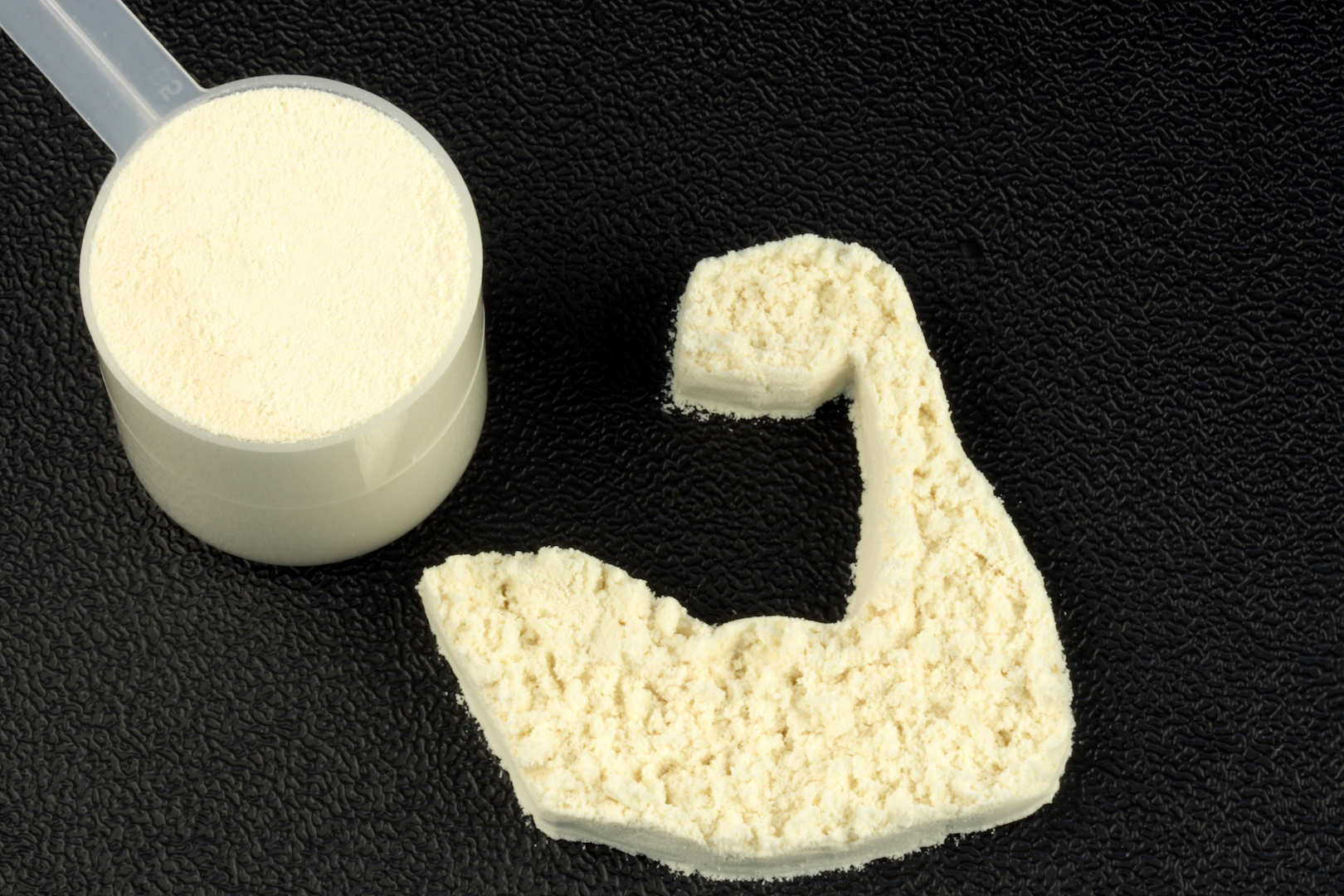Supplements
Benefits of Protein Powder
Published
5 years agoon
By
fitinstyle
Protein powder is one of the most popular nutritional supplements on the market. This supplement is essential in building muscle and weight loss. Using protein powder can also help repair tissues in your body as well as help that tone their muscles in the body. There are different types of protein powder including but not limited to dairy free, whey protein, and plant-based proteins. Most come in the form of powder and can be mixed with almost anything.
Adding protein into your diet can have many health benefits. It is one of the key ingredients your body needs to help its skin, bones, and muscles. Your body needs protein to increase the production of another chemical in the body such as hormones and enzymes. But If protein powder is good to add into your common benefit what are the health benefits?

- Weight management
Protein powder is great for those who are trying to lose weight because it can help you stay more full during your day fuller longer. Those eating diets that are protein-rich foods and taking supplements (like protein powder) can improve the urge to snack and eat in between meals. Feeling full tends to help with weight loss. This also leads to smaller portions during meals and other snacking. Another health benefit of using protein powder for weight management is that it can also help to lower your blood pressure, cholesterol which can help with other kinds of cardiovascular ailments.

- Muscle growth
This is a crucial movement for muscle growth. Including protein powder into your diet before and after gym sessions will increase the impact. Many bodybuilders and athletes use a protein supplement to help with their bulking. Protein supplements can significantly improve the muscle size and strength in healthy adults who are continually performing and practicing types of resistance training. Both men and women can use protein powder as a great supplement. However, the effectiveness of protein powder can decrease with age.

- Recovery after exercise
As well as using protein powder for muscle growth it can be used as a recovery agent for post workout hurt. Protein powders can help with the recovery of damaged muscles and damage tissue. Taking protein powder can even help with reducing the amount of muscle damage you get during your workout. This will help with your muscle protein synthesis and help to improve your muscle performance.

- Added nutrition
For adults over the age of 19, they should have a protein intake of at least 46 grams a day. This can be hard for some to reach. Adding protein powder into your daily diet can help be added nutrition for those entering their protein intake goal. Those who work out daily also needs this extra daily protein intake due to the amount they burn while at their workouts.
Protein powder can be useful for those who are looking for extra protein in their diet without increasing their meat intake. Powders can be beneficial for those who work-out, athletes, older adults and even those on diet restrictions like vegan or vegetarian. This can help get a complete source of protein.
You may like
Supplements
Review calls for more studies on cinnamon and cognitive function
Published
1 year agoon
February 14, 2023By
fitinstyle
[ad_1]

“This systematic review revealed that cinnamon and its components (eugenol, cinnamic acid, cinnamaldehyde, etc.) could affect memory and learning by decreasing amyloid plaque in the hippocampus and phosphorylation of tau-protein,” wrote researchers from Birjand University of Medical Sciences in Iran.
They attribute these brain-boosting benefits to cinnamon’s antioxidant, anti-inflammatory and anticholinesterase activity as well as neurotrophic effect, neural maintenance and insulin signaling improvement.
Cinnamon and its compounds
Cinnamon, from the inner bark of evergreen trees belonging to the genus Cinnamomum, has been used in herbal medicine for centuries from China to Egypt as remedy for respiratory, digestive and menstruation issues. Today, as supplement, it is also suggested as support for healthy glycemic response and blood pressure.
“Cinnamon is proven to have antioxidant properties and reduce inflammation through different pathways, such as the NF-kB pathway and reducing reactive oxygen species (ROS),” the researchers noted. They attribute the antiproliferative, anti-inflammatory and antioxidant effects to compounds including eugenol, cinnamic acid, cinnamaldehyde, syringic acid, tannins and catechins.
Cinnamon also contains a small amount of choline, an essential nutrient for the brain that produces the acetylcholine neurotransmitters, which in turn play a critical role in regulating memory, mood, muscle control and other functions.
Indications of potential brain benefits
The research team conducted a systematic review of 40 eligible studies selected from a total of 1,605 collected from the Web of Science, Google scholar, PubMed and Scopus databases between 2011 and 2021. They include five in vitro studies, 33 in vivo studies in rats, mice and the common fruit fly, and two clinical trials in adolescents and pre-diabetic older adults.
“One clinical study on adolescents showed a positive effect on memory using cinnamon chewing gum for 40 days, while the other reported no significant changes in memory using cinnamon administered orally (single dose/2 g),” the study reported.
Among the in vitro and in vivo studies, 16 used the cinnamon extract/cinnamon powder, while others administered a variety of cinnamon bioactives. The researchers concluded that the main outcome of most studies proved that cinnamon significantly improves cognitive function i.e. memory and learning.
“In vivo studies showed that using cinnamon or its components, such as eugenol, cinnamaldehyde and cinnamic acid, could positively alter cognitive function,” they wrote. “In vitro studies also showed that adding cinnamon or cinnamaldehyde to a cell medium can reduce tau aggregation, amyloid β and increase cell viability.”
Tangled tau proteins are associated with a range of neurodegenerative diseases, while the pathology of Alzheimer’s disease appears to be driven the production and extracellular plaque deposits of amyloid β peptide.
Call for further study
Acknowledging limitations across the collection of varied studies, the researchers call for larger studies and more clinical trials to evaluate the effects in humans.
“It is also beneficial that in vivo studies in this field propose the probable mechanism of cinnamon affecting the brain to specify the related pathways more precisely,” they added.
[ad_2]
Source link
Supplements
Omega-3 supplements may be ‘most efficient’ way to support neonatal development, researchers say
Published
1 year agoon
January 10, 2023By
fitinstyle
[ad_1]

It was also reported that after supplementing with DHA, levels of maternal DHA increased in erythrocyte phospholipids, serum, and breast milk.
“Our results confirmed usage of ‘omega’ dietary supplements as an efficient way of increasing the availability of EPA and DHA for infants,” stated Warsaw, Poland-based researchers in Nutrients.
Essential Fats
There are established recommendations for the intake of essential fatty acids (EFA) and long-chain polyunsaturated fatty acids (LC PUFAs) for pregnant women, due to the recognised importance to the mother and child’s health. It has been found that these types of fats can increase gestational period and birth weight, as well as support the development of the child, in terms of the central nervous system and cognitive function.
“LC PUFA, especially DHA, plays a pivotal role in the development of the central nervous system, visual acuity, and cognitive functions. It depends on the involvement in maintaining membrane fluidity, impulse propagation, synaptic transmission, and functioning as a cytosolic signal-transducing factors for various gene expression during the critical period of brain development, which seems to be last trimester and first few months after birth,” the researchers explain.
Due to the importance of these types of fatty acids, the present study sought to first analyse the frequency of consumption of fat sources as well as ‘omega’ supplements in pregnant patients. Secondly, the researchers measured the n-3 and n-6 serum FA contents at the time of labour of the pregnant women and their children using the GC-FID technique, to investigate subsequent nutritional status. The efficacy as well as the usefulness of the ‘omega’ supplements were then established.
Study details
Patients from the Anna Mazowiecka Clinical Hospital, consisting of 161 pregnant women, were administered dietary questionnaires to obtain data indicating dietary fat consumption as well as omega-3 supplement usage. The fatty acid profile was then assessed by obtaining maternal and umbilical cord blood samples at delivery.
The results found that 40% of the women were taking ‘omega’ dietary supplements. It was observed that taking such supplements was found to significantly increase serum levels of DHA in the pregnant women, compared to those who were not supplementing.
Additionally, it was observed that the LC-PUFA could penetrate the umbilical cord, with the blood containing significantly increased levels of EPA and DHA. As a result, the researchers concluded that utilising these supplements could be the most efficient route to achieving optical LC-PUFA status for the developing child.
The future for recommendations
The present study provides evidence that omega-3 supplements appear to boost both maternal and infant LC-PUFA levels at a time of critical need for normal development of the child.
With the researcher’s highlighting the low intake of fish observed among the studied population, Kaitlin Roke, director of scientific communication at the Global Organisation for EPA and DHA Omega-3, tells NutraIngredients “This is common across many populations.
“If this is the case, a supplement containing DHA and/or EPA would be necessary, particularly for pregnant or breastfeeding women. Some pre- and post-natal supplements may contain omega-3s in combination with other nutrients, but the levels are rarely adequate. Typically, getting a higher concentration means looking for a separate omega-3 supplement in addition to a prenatal vitamin “.
The findings provide interesting insight into shaping the future of recommendations for pregnant women, with Roke adding “Since DHA plays such a critical role in infant brain and eye development, most recommendations are ~200mg of DHA per day, but this is too low, particularly for the benefit of reducing the risk of preterm birth.
“Science is constantly evolving, and this recommendation could be modified as more research is conducted. The important message is that pregnant and breastfeeding women need to get adequate amounts of DHA through food and/or supplements.”, she concludes, highlighting the relevance of such research.
Source: Nutrients
https://doi.org/10.3390/nu15010231
“Increased LC PUFA Levels in the Serum of Pregnant Women and Their Children as a Result of Dietary Supplementation with ‘Omega’ Fatty Acids”
Authors: M. Broś-Konopielko, et al.
[ad_2]
Source link
Supplements
France to allow ‘probiotic’ on food supplements labels
Published
1 year agoon
January 10, 2023By
fitinstyle
[ad_1]

The use of the term across Europe has been contentious since European authorities view it is an implied healthy claim since the official FAO/WHO definition denotes a health claim: “Live microorganisms which when administered in adequate amounts confer a health benefit on the host”.
Despite such a stance, more European countries are moving to allow the use of the term, notably Spain, Denmark, Italy, Greece, Poland, the Czech Republic, the Netherlands, and Bulgaria.
In France, the term “probiotic” may be used on food supplement labels together with the wording “contributes to the balance of the intestinal flora” so long as products meet certain conditions, such as a minimum number of living cells per daily dose, a position that is similar to the situation in Italy.
The announcement was welcomed by a number of stakeholders in the probiotics space, with Rosanna Pecere, executive director of IPA Europe, stating: “IPA together with IPA Europe working diligently in the European environment for probiotics, are happy to see the softening position for the use of the term, and also happy with the added use of the claim.”
George Paraskevakos, IPA Global’s executive director, added: “This initiative links to all the probiotic on-going work globally and segues nicely into the continuation of the harmonization proposal of probiotic regulations at Codex Alimentarius which is set to resume later this year.
“The European market has shown the biggest jump in growth from an online sales perspective in 2022, outstripping other region growth rates by close to 5% as reported by Ewa Hudson’s Lumina Intelligence. This further emphasises the thirst for probiotic products from consumers in Europe, and further underscores the importance of the work which IPA EU and IPA are conducting not only in Europe but also globally to promote quality, safety, and probiotics that provide benefits.
“We are hoping to see more countries in Europe to follow suit in the coming year,” said Paraskevakos.
Calls for harmonization
Adding his voice to the news, Dr Luis Gosálbez, Managing Director, Sandwalk Bioventures, said: “This is yet another important regulatory event for probiotics in Europe, which undoubtedly calls for an EU-wide regulation regarding the type of products in which the term may be used (ie. foods vs. food supplements vs. both), minimum CFUs per day and claims associated, as decisions made by individual Member States are not harmonized in these regards.”
Speaking at the 2022 Probiota conference in Copenhagen, Tanne Severin Holm of the Danish Veterinary and Food Administration, also called for more harmonization across the European bloc on the use of the term: “We still do not allow use for food, but we do allow it for food supplements,” she told attendees. “We are working to try and find a harmonised approach. Member states have different approaches, and the playing field has become disharmonised, but we feel an urgent need to find a unified approach.”
[ad_2]
Source link
Recent Posts
- The Ultimate Guide to Berberine: Unlocking Its Health Benefits and Healing Properties
- The Ultimate Guide to Berberine: Unleashing its Health Benefits for Blood Sugar Control, Weight Management, and More
- The Ultimate Guide to Berberine: How This Natural Compound Can Revolutionize Your Health
- The Ultimate Guide to Berberine: Unlocking Its Powerful Health Benefits for a Healthier You
- Exploring the Health Benefits of Berberine: A Natural Remedy for Diabetes, Cholesterol, and More
Advertisement
Sponsored Ads
TRENDING
-

 HEALTH & WELLNESS5 years ago
HEALTH & WELLNESS5 years agoAcidophilus: A Probiotic Bacterium
-

 herbs3 months ago
herbs3 months agoThe Ultimate Guide to Ashwagandha Extract: Stress Relief and Optimal Health Unveiled
-

 HEALTH & WELLNESS4 years ago
HEALTH & WELLNESS4 years agoHerbs and Essential Oils to Fight Coronavirus
-

 TRAINING & FITNESS5 years ago
TRAINING & FITNESS5 years ago6 Ways to Decrease your Shoulder Pain!
-

 HEALTH & WELLNESS5 years ago
HEALTH & WELLNESS5 years agoWhy Muscles Get Sore
-

 DIET & NUTRITION5 years ago
DIET & NUTRITION5 years agoLow Carb Diet: Carbohydrates Influence on Testosterone
-

 Fitness5 years ago
Fitness5 years ago“No Pain, No Gain” True or Just a Fitness Myth
-

 HEALTH & WELLNESS5 years ago
HEALTH & WELLNESS5 years agoThe Best Shoulder Workout in Only Six Moves


